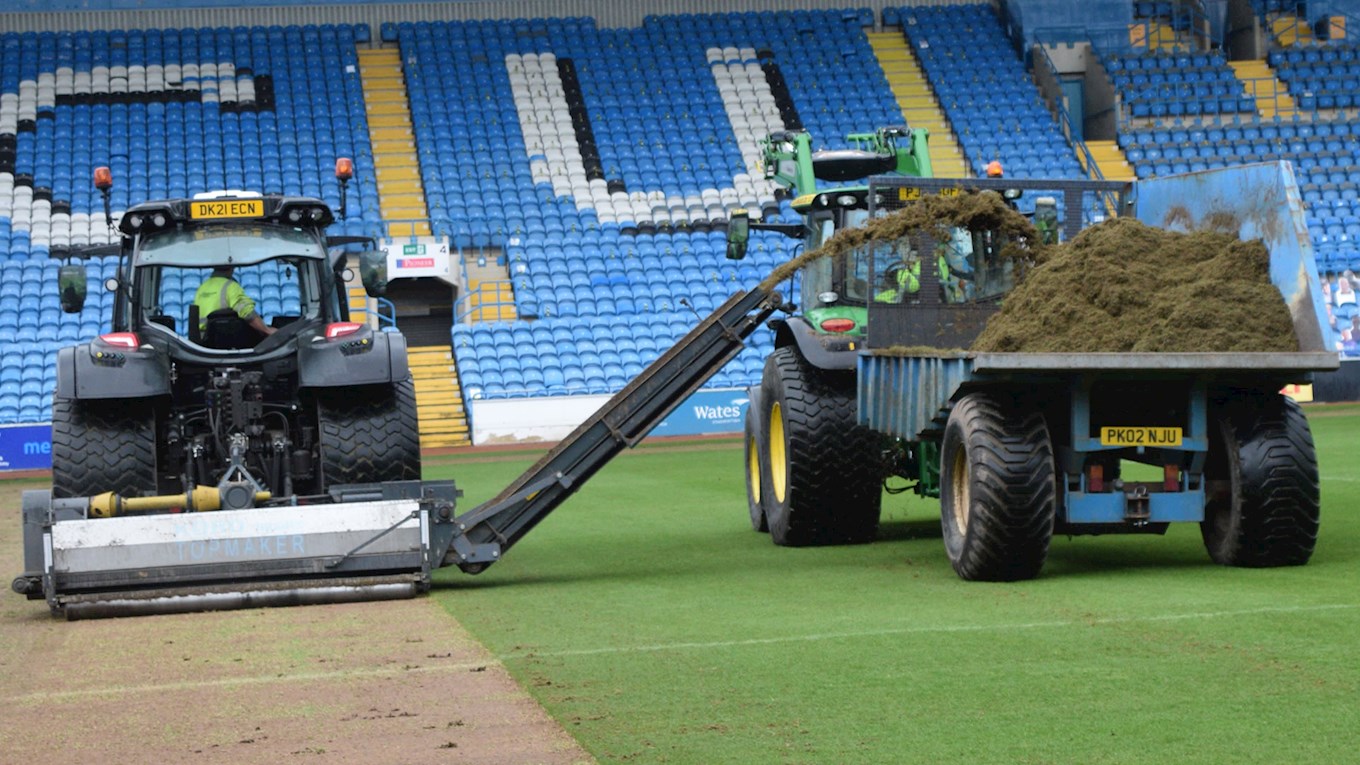Always a subject of interest once the season has drawn to a close has been the work to be done on the main pitch, and on the training pitches at Brunton Park and Creighton.
From an operational point of view, chief executive Nigel Clibbens explained: “The work we can do in the closed season each year is determined not just by money, but firstly by football pre-season training requirements and the schedule of friendly fixtures, which must take precedence.
“These football decisions dictate the remaining time for work and regrowing before the pitches are needed again and that, in turn, determines the options for the type of remedial work that can be done.
“Those considerations all come into play before cost has even been considered. With the football plans already put in place for pre-season training and friendlies, that obviously constrains what we can do in this summer period. Compromises have to be made, but that’s normal.”
On the main Brunton Park playing surface, he added: “This is the top pitch priority and will get the lion’s share of the spending.
“We want to provide the best playing surface possible, better than our rivals, and we want to be seen as making a positive contribution to winning and playing football as the manager wants it to be played.
“When it comes to Creighton Dave has a plan of works to titivate the surface, but that’s an unsecured public site that we hire, with no water or drainage. That makes other works of no real value.
“However, the planned work will make improvements, which is important.”
“The training pitch behind the stadium will have more investment than at any time since the last flood,” he revealed. “With the surface removed it will be verti-drained, levelled, sanded and seeded.
“This again is the maximum amount of work that can be practically undertaken in the time available. Without a six-figure sum invested in drainage, this is the best option.
“The work to be carried out is aimed at making it more attractive to train on, therefore reducing the desire to train on the main pitch which, of course, will help to protect the playing surface.”
“Overall we have some good lessons learned from what was a challenging year,” he concluded. “Unlike many clubs in League Two we did some remedial pitch work last summer, despite covid and huge financial concerns.
“Admittedly, this was less than ideal and, even with that work, the pitch deteriorated more compared with the season before.
“The assessment from Dave Mitchell is that it would have been far worse and would have occurred far earlier had that work not been done, so the summer 2020 efforts did make a positive difference.
“The planned work for this summer, which is happening as we speak, will be detailed by Dave on the official channels over the coming days.”
The ‘next level’ for pitch improvements would be a major overhaul, something which has been discussed at the club.
“As part of Dave’s job, he does lay out in detail the different levels of works that could be done as we start to get towards the off-season period,” he commented. “That includes the total rebuild option, which is more than double the cost of the current planned pitch works.
“It would require external funding, or new football fortune, so it isn’t affordable or justifiable in the current circumstances.
“Obviously we all come under scrutiny if we lose games to the weather, and that does lead to more lessons learned which we can take into our review of what needs to be done going forward.
“In January and February there was a lot of comment on the adequacy of our pitch covers, but Dave Mitchell said at the time that the temperatures and prolonged period of cold would probably have led to postponements anyway.
“A leading pitch cover specialist in the UK has been consulted. It is clear to us from those discussions that the nature of our frost risk, the alternative covers available, and with the covers we already have, that new covers would bring no certainty of improvement.
“Over the course of the last 10 years, for example, we lost a minimal number of games to frost with the same covers in use. It is an obvious option to get something new, but this would be in response to exceptional frost conditions that aren’t the norm. As I’ve already said, new covers have no guarantee that they would work any better in those extreme circumstances.
“Additionally, there is no escaping the fact that any new covers would need to be funded. Given the costs quoted, and alternative demands for any cash we have, there is no point in purchasing replacements unless they are guaranteed to bring outcomes the existing covers wouldn’t achieve.”
“Recently we have also talked about the use of pitch lights,” he concluded. “Chris Beech actually spoke about this after the Orient game, and it is something that we’re looking into.
“As ever we need to make a balanced assessment. We’ll assess the options and update as things develop.”

